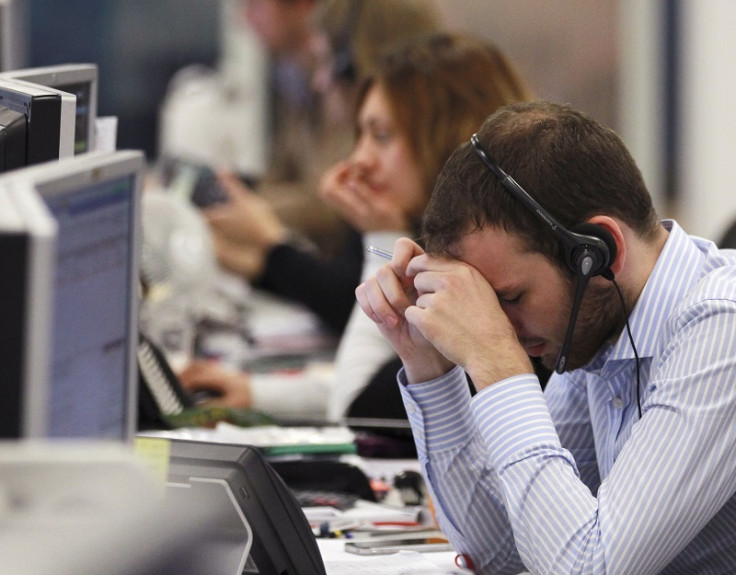Suicide in the City: Why the Financial Industry Needs to Stop Being a Pressure Cooker

Politicians and the public have mainly called for an overhaul in the financial industry's culture to stop mass scandals and mis-selling from reoccurring but what many are failing to address is that a significant change in the working environment is desperately needed.
While putting financiers under less pressure will undoubtedly help stop the spate of costly scandals from rearing its ugly head in the future, a deep cultural change, to what big bosses expect from their staff, will also help diminish the human cost of city.
It is easy to sweep aside any suicide or burnout, in London's Square Mile to the New York's Wall Street, as being a result to 'personal issues' but mental health problems, such as depression and stress, can stem from intense working environments.
"But what do bankers expect? They are getting paid heaps of money!" – I hear you cry.
But like an abusive relationship, just because it is the norm, to be hit or screamed at on a daily basis, this doesn't make it right or any more acceptable.
From the Top, Down
The widely publicised suicide of Pierre Wauthier, the former chief financial officer at Zurich Insurance, has fallen back into the spotlight as his widow and family plan to storm the group's annual general meeting today to demand answers over his death.
Tragically, Wauthier, who had previously called his CFO role as his 'dream job', left two suicide notes and within one of them, named his boss (at the time) Joseph Ackermann as creating an "unbearable working environment".
Ackermann stepped down after the details of the note were made public by Wauthier's family but he explicitly said the allegations were "unfounded".
Zurich Insurance also launched an investigation into his death and said recently "we are still saddened by what has happened, and we will never know the reasons for his irreversible decision."
Wauthier's widow recently said, in a rare interview, that he had visited HR several times before taking his own life over "undue pressure."
Coupled with the spate of financier suicides in London and interns dying from alleged exhaustion, it is time we started putting more credible stock into changing the working environment.
The attitude towards mental health in the workplace is still a taboo and, arguably, even more so in finance, where many unconsciously feel that the more wealthy may not have a 'right' to take time out for stress or for depression.
When António Horta-Osório, the chief executive of the Lloyds Banking Group, temporarily stepped down from his position citing a stress related illness in 2011, many were calling it "embarrassing" for the bank.
Many articles were churned out detailing why he almost had the "audacity" to cite stress when the part taxpayer owned bank was still dealing with compensating companies from a raft of scandals that effectively screwed over the little person.
Moreover, when compliance chief, Sir Hector Sants, resigned from Barclays because of "stress and exhaustion" after being on sick leave for a few months, his departure was met with little sympathy.
Exacerbation
We spend more time at work than any other place or activity in our lives and a highly pressurised and cutting environment can either start chipping away at your mental health or dragging you under in a pool of depression.
IBTimes UK reported how 12 finance professionals are thought to have committed suicide so far this year and that includes William Broeksmit, a former Deutsche Bank executive found dead at his west London home.
From the top of the food chain, to the lowly interns, 60 hour weeks and endless demands will always be tough to deal with. On top of that, having a culture of showing your worth through the amount of deals you close in a week to the amount of physical hours you are sacrificing for your career are also part of the parcel.
One banker at one of the biggest banks in Britain, who has now left the industry, used to tell me about having to only go home for a couple of hours to change their clothes and take a taxi back into work at 0330 GMT in order to take a meeting with Japanese clients.
Another, who still works in banking, constantly tells me about the unspoken but well accepted pressure to never be "off duty." From the moment they step in the office, from the instant they catch a couple of hours of sleep, they are expected to produce results – including entertaining clients and closing deals.
Meanwhile, major UK companies have collaborated to launch a national campaign to end the "culture of silence" around mental ill health in the workplace and tackle the £70bn per year issue.
The campaign is being led by Business in the Community's (BITC) new Workwell Mental Health Champions Group, whose founding members include BT, Bupa, RBS, Mars and Procter & Gamble.
According to the organisation's research, the current "culture of silence" around mental health is stifling UK business productivity and competitiveness.
"Mental health problems are common, but too often people don't speak up, fearing a negative response, which means they don't get access to timely support," said Paul Farmer, chief executive of mental health charity Mind.
But how about the banks, insurers, and brokers?
Maybe it's time to stop peddling out the PR approved cookie cutter condolence messages to the families and start putting their money where their mouths are and start to bring about real change.
The Samaritans provides a free support service for those who need to talk to someone. They can be contacted through their website or on 08457 90 90 90, 24 hours a day, 365 days a year. Call charges apply.
© Copyright IBTimes 2025. All rights reserved.






















